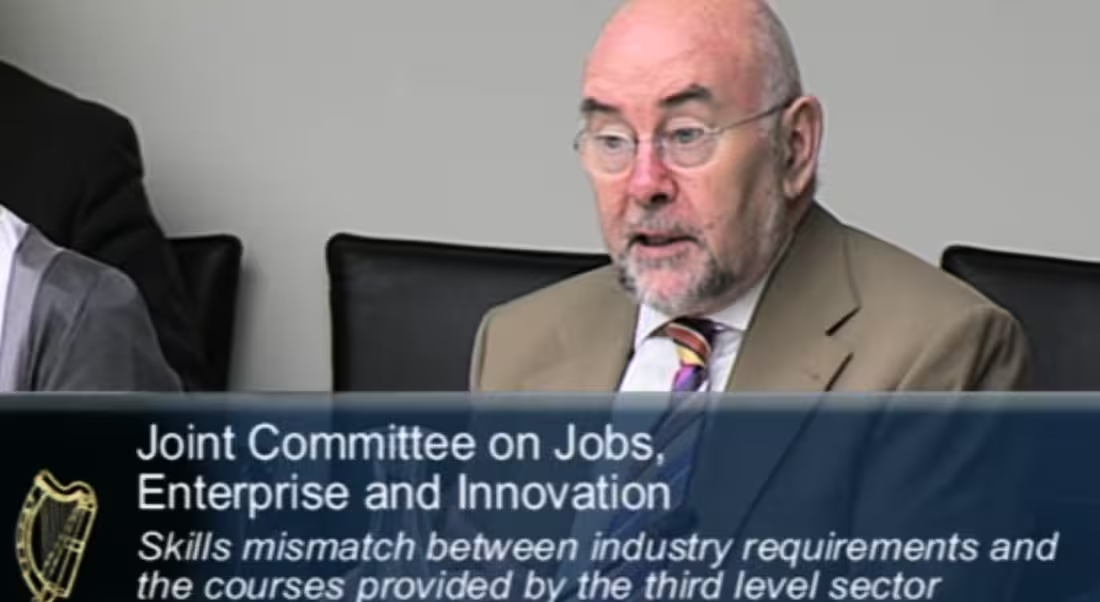Education Minister Ruairi Quinn, TD, has outlined radical new steps to boost the quality and skills of our future workers, including producing better teachers, scrapping the Junior Cert and reforming the university system currently hinging on CAO points.
Quinn was attending an Oireachtas Committee on Jobs, Enterprise and Innovation, which met to discuss a perceived mismatch between the ICT industry’s skill needs and what Ireland’s third-level sector is actually producing.
Last month, the committee led by Damien English, TD, published a report reviewing ICT skills demand in Ireland that revealed 75pc of ICT companies are looking for workers and there are currently 4,500 vacancies – a startling fact during a time of high unemployment.
In many cases students were missing out on these career choices because the schools simply weren’t telling them about these opportunities.
Back to kindergarten
Quinn said he acknowledged the report’s findings but said the issue relates not solely to third level but that the overdue reforms extend all the way back to kindergarten level in Ireland.
“We got in this country a wake-up call in the autumn of 2009 when we dropped from fifth place in the PISA ranking of literacy to 17th place and a proportionate fall in relation to maths and science and everybody, including officials in the Department of Education, said this was a problem.”
He said the shock findings galvanised civil servants and the department, then led by Batt O’Keeffe, to respond.
“If we’re talking about ICT skills then literacy and numeracy are the core building blocks.”
Quinn said Ireland has been complacent for decades about the excellence of its education system but never stopped to look at how other education systems are doing.
Start with the teachers
In tandem with major changes to the curriculum, including the looming removal of the Junior Cert and replacing it with a form of continuous assessment and preparing students for their final school exams earlier, Quinn said the focus needs to be on the actual training of teachers.
“Singapore, with a population of 5m people, has only one teacher training college that deals with everything from primary school to secondary school. Finland, the poster child of the education world, has eight teacher training colleges. Ontario has 13 and this lovely country of ours has 19.”
Quinn said a survey of the situation recommends re-configuring those 19 teacher training colleges down to a cluster of just six.
“In addition to this, the three-year course for primary school teachers will be extended to four years. An awful lot of the traditional quasi-academic first arts degree qualifications which had little or no relevance to the teaching of primary teaching will be stripped out and the focus will be exclusively on pedagogic skills.”
At second level, Quinn said the traditional sequence of arts, science or commerce graduates going into second level after a one-year higher diploma (HDip) will be abandoned in favour of a more intensive two-year diploma.
Also to be abandoned is the questionable tradition of school graduates of varying degrees of competency completing an arts, science or commerce degree and then returning to work full-time at their original secondary school after qualifying with a teaching diploma. “Their life experience would be somewhat limited and this is repeated right across the country.
“This is going to be replaced by a two-year cycle as distinct from a one-year cycle and it will be much rigorously invigilated and examined with the focus on international skills.”
Quinn defended the radical changes by saying every piece of international evidence demonstrated “without question that good teachers produce great results and good teachers trump all other advantages and disadvantages, such as 1:5 ratio or an IT-powered school. It really rests on the quality of the teacher.”
He added that Ireland should count itself lucky to have a 9:1 application rate for teacher places in Ireland – in other countries there is a problem attracting people to the teaching profession.
Creating a workforce with academic and people skills
In terms of reaching the new literacy and numeracy level, Quinn said the Junior Cert is no longer sufficient for our times and is to be scrapped.
He pointed to Finland, Scotland and New Zealand, where they don’t have ‘high stakes’ exams for 15-year-olds. “That’s because they don’t want children leaving school at just 15 with a state exam reference. The simple thing to do is to remove it.”
The new structure will consist of 60pc examination and 40pc project work and will be blended between teacher assessment and State assessment.
“This will lead to a much more clinical assessment of the student’s ability and this will be close to the PISA assessment period when they’re doing exams at 15.”
Quinn said the measures will free up more productive time for teachers and students to focus earlier on the Leaving Cert.
They will also free up teachers to focus on developing students’ interpersonal skills. “All the rounded things that go into making a good emerging employee – such as doing presentations, working in a group.”
Quinn said he is determined to see the changes through and avoid the kind of political interference that is stifling education reform in the UK.
“We can’t turn this around quickly. We have to have the confidence of the teaching community and maintain the trust of parents. And in a country where the trust of so many of our institutions has been undermined, there is still 100pc trust in the integrity of our examination system. I am very conscious of that and we will need to move slowly.”
He said the first cohort of students who will experience the new system will enter second level in 2014 and it will be 2017 by the time they encounter the new examination structure for English. Over the remaining three years to 2020 the balance of the curriculum changes will be rolled out.
Other changes will be introduced, such as involving the local business community in schools to help teach children more about business and entrepreneurship. “In many parts of the country work experience placement is a totally informal system that depends on who you know,” he said, adding that this doesn’t work for a host of people.
Third-level reform
Quinn said the CAO points system is top of the list of things that needs to be changed about the college system. He said the system which affects seven universities, 17 institutes of technology and a number of other bodies amounting to 30 bodies has to be reformed.
“The CAO is ‘crowd control for the radio stars of universities’, as it has been inelegantly described and they [the universities] only allow other colleges to participate on their terms and conditions. The allocation of points is a value system owned by the seven universities. We have had a lot of criticism in relation to the impact the points system is having on second level.”
In a review of the system, he asked the universities to consider their future, be pragmatic and look at how they can cluster on a regional basis and eliminate duplication.
“There are 19 college locations for teacher education and 40 different courses of engineering in the Irish education system. Do we need three business schools in Dublin? Can the business schools complement one another?”
He said that one of the lessons from the 1960s is that forced amalgamations do not work and so he is trying to encourage the colleges to come together, share resources and reform the system from a bottom-up perspective.
“That’s the carrot, but at the end of the day the stick is the national cheque book for third-level financing and over the next 12 months we hope to get a structured response from the institutions.”
“That’s the long road to education we need if we are going to have a workforce we require.
“That doesn’t mean today’s labour market needs or shortages can be ignored and there is worldwide demand for ICT skills. There is a worldwide shortage. There are 5m job opportunities right now in the EU for people with ICT skills,” Quinn told the committee.
Watch out for Silicon Republic’s Future Jobs Forum which takes place in the Convention Centre Dublin on Friday, 8 February, and which will gather Ireland’s leaders in the ‘knowledge economy’ to look at constructive solutions as we race to win the battle for global talent. Event site goes live in coming days.




